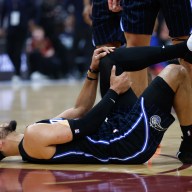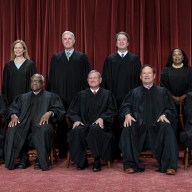TORONTO – As it turns out, the Sedin twins weren’t the only Scandinavians who nabbed major TV time during the recent Stanley Cup final.
The buzzy Danish pop group Asteroids Galaxy Tour also got to take a bow with their starring role in the oft-played Heineken ad “The Entrance.” If you were watching playoff hockey you probably know the one: an artfully scruffy chap in a slim-fitting tux glad-hands global ambassadors at a posh soiree before pulling off a series of improbable feats. He wins a mock duel with a black-hatted gunslinger; yanks a white tablecloth without disturbing the beers situated on top; and swishes a jump shot on a hoop positioned 30 feet in the air.
The spot is backed by Asteroids Galaxy Tour’s vamping, retro-soul tune “The Golden Age,” and the group’s telegenic pixie of a lead singer, Mette Lindberg, gets some face time in the form of a duet with the commercial’s multi-talented protagonist. And Heineken went even further than featuring the group in its ad — the beer company also sponsored a separate music video for the song.
For an obscure independent act, that exposure has proved invaluable. In other words, unlike the Sedins in that aforementioned championship series, Asteroids Galaxy Tour has scored big here.
“It’s been massive,” Lindberg said down the line from her native Copenhagen, where she and her bandmates are in the midst of crafting a new album.
“We are a new band and we are on a really small label. And we do everything ourselves — like (bands did) back when indie was indie. So it’s been a great help promoting us.”
Indeed it has. But why would a company pony up the cash for a music video that barely features its product? And since when do major corporations care about promoting the quirky little ditties featured in their ads?
In fact, this sort of integrated marketing — and mutual back-scratching between a company and the creative talent it employs in its marketing — is becoming the latest trend for corporations that want their commercials to do more than simply flicker across TV screens.
Now that PVRs allow many TV viewers to zoom through pesky commercials at will, advertisers have greater incentive to try to create memorable pieces that people will actually want to watch — and, if they’re really lucky, show to their friends.
“Advertising is trying to get more and more creative with how people like their ads, and especially share their ads,” said Julie Stolberg, associate creative director with the Toronto-based ad agency Dashboard, which specializes in social media marketing and brand strategy.
“You have to be giving someone something — and in this case, it’s a really awesome piece of music.”
Yes, for advertisers these days, finding a cool — and perhaps just as important, obscure — piece of music to score ads has become an increasingly prominent priority.
Entertainment Weekly recently launched a semi-regular feature in which the magazine identifies the earworm tunes airing in commercials. Artists including Calgary-reared indie queen Feist and genre-hopping U.K. product M.I.A. are merely two of the many acts who have broken through to the mainstream after scoring popular ads.
So it’s hardly a surprise that the key component for many cool-hunting advertisers lies in discovery. If advertisers are looking to spawn a viral hit, it’s not enough that a song simply be infectious — it also has to be entirely new to most viewers.
“It’s quite easy to take a song that everybody knows and loves and already has a relationship with, but you don’t benefit as much from that,” said Mark Bernath, executive creative director for Wieden and Kennedy Amsterdam, who created the Heineken campaign.
“It’s almost too easy in a way.”
Added Stolberg: “People are watching TV with their phone and their iPad and their laptop beside them. We’re looking to media to help us navigate the massive world of music … and I don’t think enough brands are doing it.”
In Heineken’s case, “The Golden Age” has certainly brought its share of sparkle.
The slick, hip commercial is as pervasive as it is persuasive, amassing well over 4 million views on YouTube in its several incarnations (some in different languages).
And the glossy new music video for “The Golden Age” is also a hit — two separate videos for the song have elicited more than 6 million YouTube clicks.
The Heineken-produced video — which tones down the branding of the original ad but still carries obvious associations to the green-bottled Dutch beer — functions, at the very least, as clever product placement.
“I’m more likely to watch a music video than I am a commercial,” Stolberg said. “Their commercial is really engaging, but you see it on TV three times a night, (whereas) a music video — you know it’s an ad, you know Heineken paid for it, but it’s also entertainment.
“So for them, it’s credibility, it’s shareability, it’s all those good things they want that they’ve realized ads don’t do online.”
Of course, the cross-promotion has also been a boon for the Asteroids Galaxy Tour, even beyond the widespread popularity of the ad. They have now secured a powerful ally in Heineken who has a vested interest in seeing the group succeed (and indeed, Bernath notes that the group has now played music festivals around the world sponsored by the beer company).
“I mean, you don’t sell any albums anymore, since people download illegally for free,” Lindberg said. “So it’s kind of a good way to get your PR sponsored.”
And some observers think these sorts of arrangements could eventually have a major effect on the music industry, not just advertising.
“I think that the economics of the music industry are changing in ways that nobody fully understands,” said Ajay Agrawal, a professor of entrepreneurship at the Rotman School of Management in Toronto.
“A lot of people will be watching these types of innovations because entrepreneurship is alive and well in the music industry in a way it has not been until the last few years.”
And as that transition occurs, old concerns about the loss of credibility when an artist endorses a product seem to be fading. Lindberg points out that Brad Pitt and Jay-Z have both hawked Heineken and haven’t suffered for it.
Meanwhile, the ad in which Lindberg stars is airing around the world, from the U.S. to Vietnam to South America — everywhere, it seems, except the group’s home country.
“That campaign is running a lot of places but it’s not running in Denmark,” she said.
“And I have no idea why. Denmark is very small, so a Danish band (being) in a big worldwide commercial — you would get even more attention.”
















